新概念英语第一册第73课学习资料
- 格式:ppt
- 大小:1.79 MB
- 文档页数:15
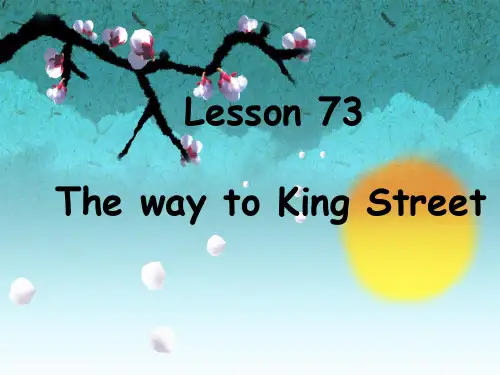
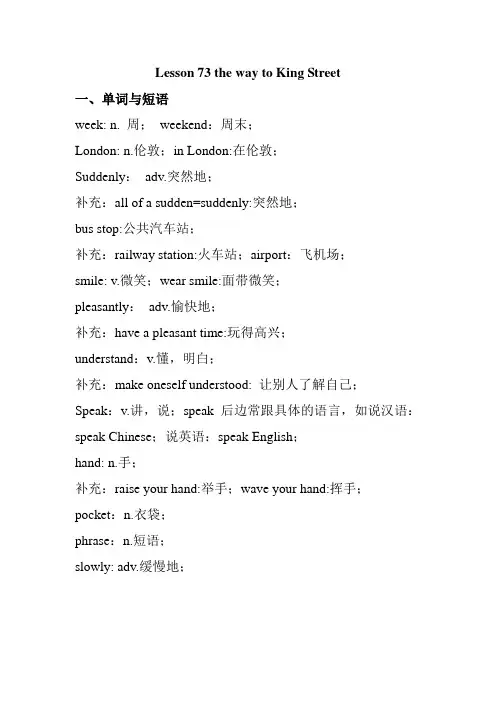
Lesson 73 the way to King Street一、单词与短语week: n. 周;weekend:周末;London: n.伦敦;in London:在伦敦;Suddenly:adv.突然地;补充:all of a sudden=suddenly:突然地;bus stop:公共汽车站;补充:railway station:火车站;airport:飞机场;smile: v.微笑;wear smile:面带微笑;pleasantly:adv.愉快地;补充:have a pleasant time:玩得高兴;understand:v.懂,明白;补充:make oneself understood: 让别人了解自己;Speak:v.讲,说;speak后边常跟具体的语言,如说汉语:speak Chinese;说英语:speak English;hand: n.手;补充:raise your hand:举手;wave your hand:挥手;pocket:n.衣袋;phrase:n.短语;slowly: adv.缓慢地;二、短语、句型及语法1、She does not know London very well, and she lost her way.他对伦敦不很熟悉,因此迷了路;在本句中有两个知识点需要引起注意:①know、、、well:对、、、了解,例:I know him very well.我非常了解他;I do not know the book very well.我对这本书不是很了解。
②关于与way相关的几个重要短语:lose one′s way: 迷路;I lost my way yesterday:昨天我迷路了;on the way to、、、在去、、、的路上;例:Tom is on the way to school now.汤姆现在正在去学校的路上。
by the way:顺便提一下,顺便问一下,例:By the way, I have something to tell you.我顺便有些事情想告诉你。
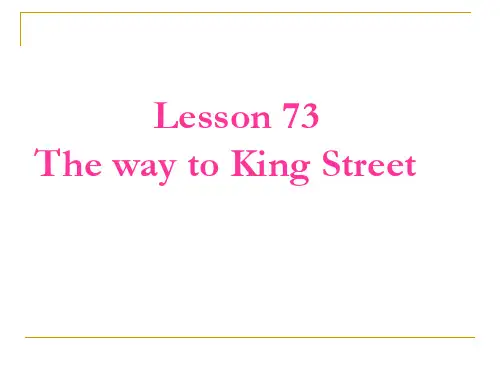
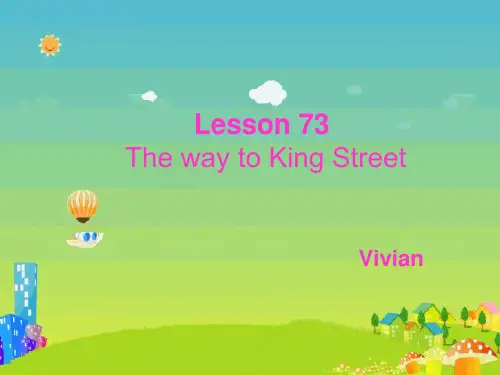
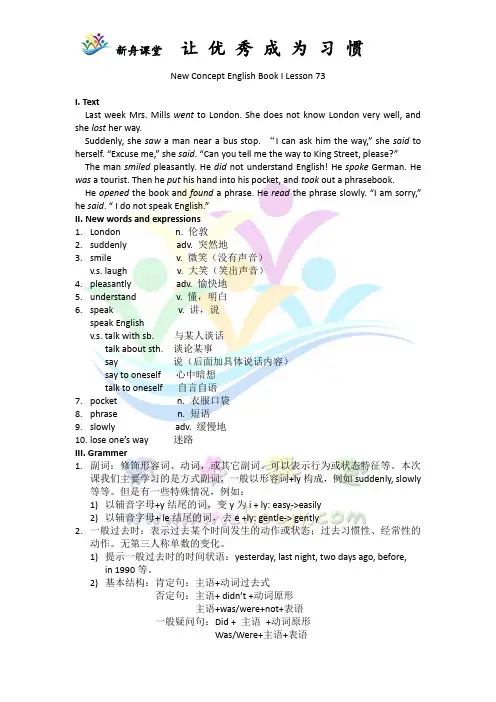
New Concept English Book I Lesson 73I. TextLast week Mrs. Mills went to London. She does not know London very well, and she lost her way.Suddenly, she saw a man near a bus stop. “I can ask him the way,” she said to herself. “Excuse me,” she said. “Can you tell me the way to King Street, please?”The man smiled pleasantly. He did not understand English! He spoke German. He was a tourist. Then he put his hand into his pocket, and took out a phrasebook.He opened the book and found a phrase. He read the phrase slowly. “I am sorry,”he said. “ I do not speak English.”II. New words and expressions1.London n. 伦敦2.suddenly adv. 突然地3.smile v. 微笑(没有声音)v.s. laugh v. 大笑(笑出声音)4.pleasantly adv. 愉快地5.understand v. 懂,明白6.speak v. 讲,说speak Englishv.s. talk with sb. 与某人谈话talk about sth. 谈论某事say 说(后面加具体说话内容)say to oneself 心中暗想talk to oneself 自言自语7.pocket n. 衣服口袋8.phrase n. 短语9.slowly adv. 缓慢地10.lose one’s way 迷路III. Grammer1.副词:修饰形容词、动词,或其它副词。

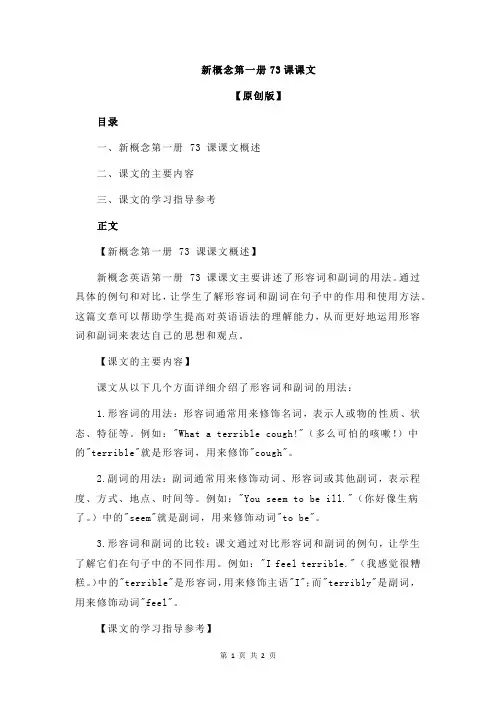
新概念第一册73课课文【原创版】目录一、新概念第一册 73 课课文概述二、课文的主要内容三、课文的学习指导参考正文【新概念第一册 73 课课文概述】新概念英语第一册 73 课课文主要讲述了形容词和副词的用法。
通过具体的例句和对比,让学生了解形容词和副词在句子中的作用和使用方法。
这篇文章可以帮助学生提高对英语语法的理解能力,从而更好地运用形容词和副词来表达自己的思想和观点。
【课文的主要内容】课文从以下几个方面详细介绍了形容词和副词的用法:1.形容词的用法:形容词通常用来修饰名词,表示人或物的性质、状态、特征等。
例如:"What a terrible cough!"(多么可怕的咳嗽!)中的"terrible"就是形容词,用来修饰"cough"。
2.副词的用法:副词通常用来修饰动词、形容词或其他副词,表示程度、方式、地点、时间等。
例如:"You seem to be ill."(你好像生病了。
)中的"seem"就是副词,用来修饰动词"to be"。
3.形容词和副词的比较:课文通过对比形容词和副词的例句,让学生了解它们在句子中的不同作用。
例如:"I feel terrible."(我感觉很糟糕。
)中的"terrible"是形容词,用来修饰主语"I";而"terribly"是副词,用来修饰动词"feel"。
【课文的学习指导参考】为了更好地学习这篇课文,学生可以参考以下学习指导:1.熟读课文,理解形容词和副词的定义和用法。
2.通过例句加强对形容词和副词的理解,注意它们在句子中的位置和作用。
3.练习使用形容词和副词,提高自己的表达能力。
4.与同学或老师交流,分享自己对形容词和副词的理解和运用心得。
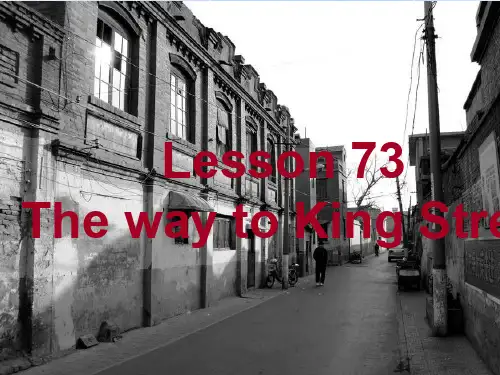
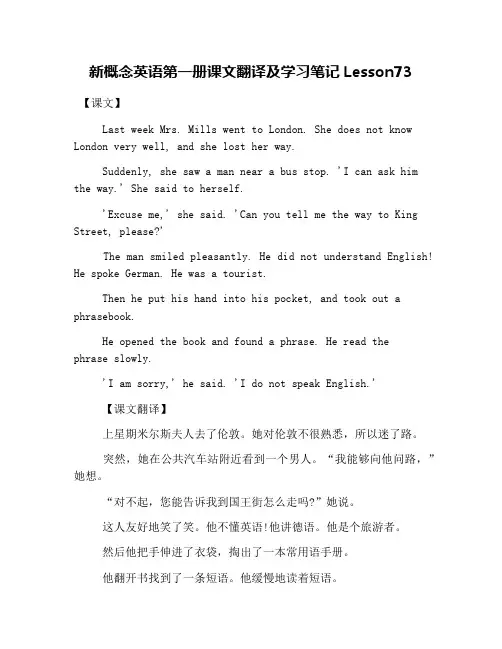
新概念英语第一册课文翻译及学习笔记Lesson73【课文】Last week Mrs. Mills went to London. She does not know London very well, and she lost her way.Suddenly, she saw a man near a bus stop. 'I can ask him the way.' She said to herself.'Excuse me,' she said. 'Can you tell me the way to King Street, please?'The man smiled pleasantly. He did not understand English! He spoke German. He was a tourist.Then he put his hand into his pocket, and took out a phrasebook.He opened the book and found a phrase. He read thephrase slowly.'I am sorry,' he said. 'I do not speak English.'【课文翻译】上星期米尔斯夫人去了伦敦。
她对伦敦不很熟悉,所以迷了路。
突然,她在公共汽车站附近看到一个男人。
“我能够向他问路,”她想。
“对不起,您能告诉我到国王街怎么走吗?”她说。
这人友好地笑了笑。
他不懂英语!他讲德语。
他是个旅游者。
然后他把手伸进了衣袋,掏出了一本常用语手册。
他翻开书找到了一条短语。
他缓慢地读着短语。
“很抱歉,” 他说,“我不会讲英语。
”【生词】week n. 周London n. 伦敦suddenly adv. 突然地bus stop 公共汽车站smile v. 微笑pleasantly adv. 愉快地understand (understood ) v. 懂,明白speak (spoke ) v. 讲,说hand n. 手pocket n. 衣袋phrasebook n. 短语手册,常用语手册phrase n. 短语slowly adv. 缓慢地【知识点讲解】在新概念一的课本里,73课前面有一个小测试,有书的同学能够自己做一下检验一下学到现在的水平。
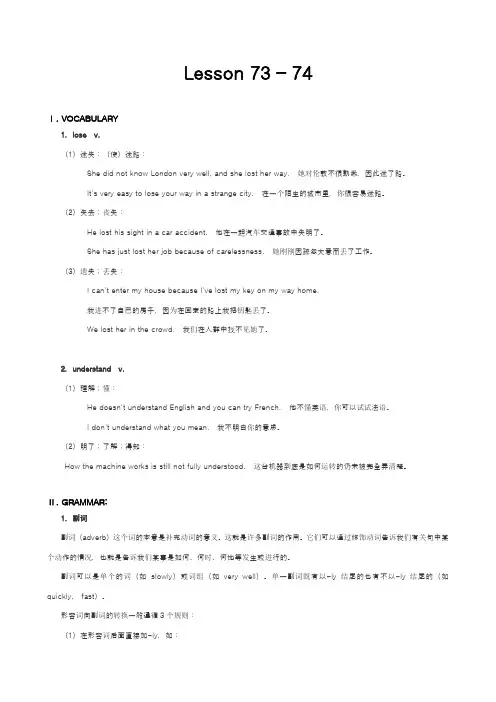
Lesson 73 – 74Ⅰ. VOCABULARY1.lose v.(1)迷失;(使)迷路:She did not know London very well, and she lost her way. 她对伦敦不很熟悉,因此迷了路。
It's very easy to lose your way in a strange city. 在一个陌生的城市里,你很容易迷路。
(2)失去;丧失:He lost his sight in a car accident. 他在一起汽车交通事故中失明了。
She has just lost her job because of carelessness. 她刚刚因疏忽大意而丢了工作。
(3)遗失;丢失:I can't enter my house because I've lost my key on my way home.我进不了自己的房子,因为在回家的路上我把钥匙丢了。
We lost her in the crowd. 我们在人群中找不见她了。
2.understand v.(1)理解;懂:He doesn't understand English and you can try French. 他不懂英语,你可以试试法语。
I don't understand what you mean. 我不明白你的意思。
(2)明了;了解;得知:How the machine works is still not fully understood. 这台机器到底是如何运转的仍未被完全弄清楚。
Ⅱ. GRAMMAR:1.副词副词(adverb)这个词的本意是补充动词的意义。
这就是许多副词的作用。
它们可以通过修饰动词告诉我们有关句中某个动作的情况,也就是告诉我们某事是如何、何时、何地等发生或进行的。
副词可以是单个的词(如slowly)或词组(如very well)。
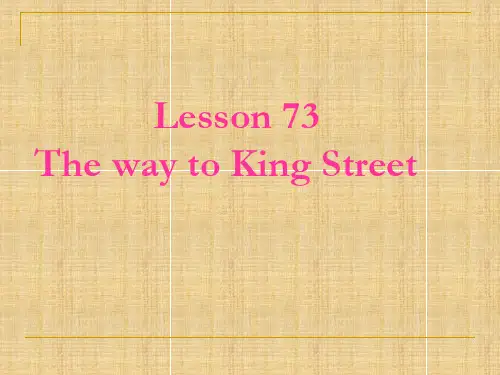
【知识点讲解】1. 今天还是继续熟悉一般过去式。
我们看到在课文一开始就用Last week 来点明事件发生的时间,把整个语境都摆到了过去的状态里。
有同学可能会问:那第二句也用到 She does not know London very well... 这里也是一般现在时态啊!我们要注意的是,这里说“米尔斯夫人不熟悉伦敦”是一个持续的状态,不是说米尔斯夫人在上周才不熟悉伦敦,而是她一直以来都不熟悉,所以这里前半句用的是一般现在时态,紧跟着的一句“she lost her way ” 又回到一般过去式了。
,2. 还是第二句中“...and she lost her way.” 这里我们看到中文的翻译是“所以她迷路了”。
这并不是说and 的意思可以是“所以”,and 还是“以及、和”的意思,这里只是用中文惯式的连词“所以”来翻译了这个意思而已。
3. 今天又学到了两个不规则的动词过去变化,大家要特别记忆一下:speak -Lesson73Last week Mrs. Mills went to London. She does not know London very well, and she lost her way.Suddenly, she saw a man near a bus stop. 'I can ask him the way.' She said to herself.'Excuse me,' she said. 'Can you tell me the way to King Street, please'The man smiled pleasantly. He did not understand English! He spoke German. He was a tourist.Then he put his hand into his pocket, and took out a phrasebook.He opened the book and found a phrase. He read the phrase slowly.'I am sorry,' he said. 'I do not speak English.' 上星期米尔斯夫人去了伦敦。
1 / 4新概念英语单词第一册第73课:到国王街的走法【单词例句】A:How long will the meeting last? A:这次的会议要持续多长时间?B:It will last for about one week. B:大约要持续一周时间。
London ['lndn]伦敦suddenly ['sd()nl] adv.突然地【单词例句】A:I feel quite embarrassed for suddenly having to makethis kind of request. A:突然不得不提出这样的请求,实在不好意思。
B:It doesn't matter. Go ahead, please. B:没关系,请说吧。
bus [bs] stop [stp]公共汽车站smile [smal]微笑【单词例句】A:To go to the English Comer is to give you a goodchance to open your mouth to speak.A:去英语角就是给你一个开口说英语的好机会。
B:MaybeI can go thereto have a try. B:也许我能够去那儿试一试。
2 / 4hand [hnd]手【派生词】handkerchief手帕【单词扩充】arm手臂【单词搭配】hand in hand手牵于hands up举手give a hand协助【单词例句】A:Hold the steering wheel with your hands at teno'clock and two o'clock. A.把手握在方向盘的10点及2点钟方向。
B:And what shallI do then? B:我接着该这么做?pleasantly ['plezntli]adv愉快地understand ['plezntli]懂,明白【派生词】understanding理解nusunderstand误解【单词搭配】understand each other互相了解【单词例句】A:We have to be fair about these things A:对这种事情,我们一视同仁。